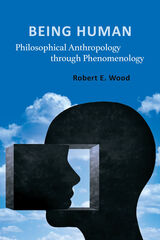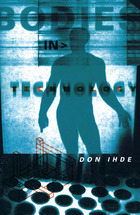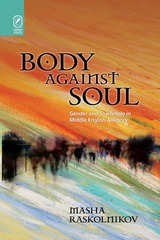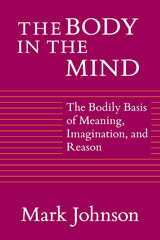123 books about Mind & Body and 4
start with B
123 books about Mind & Body and 4
123 books about Mind & Body
4 start with B start with B
4 start with B start with B

Being Human
Philosophical Anthropology through Phenomenology
Robert E. Wood
Catholic University of America Press, 2022
Being Human is the fruit of many years teaching Philosophical Anthropology, conducting Phenomenological Workshops, and reading classic texts in the light of a reflective awareness of the field of experience. Being Human is intended to look to what is typically assumed but not examined in much of current philosophical literature.
Today what typically appear as philosophical are textual studies that draw upon wide-ranging scholarship to learn how past thinkers used to think; or works that tend either to be “high-flying,” operating at levels of abstraction far removed from experience and written in arcane style, and thus, for both reasons, difficult to assess (much of Continental thought); or minutely focused upon particular claims and the arguments that can be advanced for and against them (Analytical thought); or deconstructing texts to show how they do not fully work (the followers of Jacques Derrida). Scholarly study, abstract constructions, refined arguments, and deconstructive strategies are each important in their own way; but all take place within the structure of the field of experience which is typically assumed without paying explicit attention to it. Especially in philosophy of mind, the overall field of experience has too often been ignored, usually in favor of some conjecture as to how our ordinary categories would have to be changed when neuro-physiology will be far enough advanced to explain all our behavior.
Robert E. Wood claims that it is best to understand what it is that is supposed to be explained before conjecturing about possible explanations. But when you do that, you will have to come to terms with what it means to seek explanation, what a Who is that seeks it, and why it is sought.
[more]

Bodies In Technology
Don Ihde
University of Minnesota Press, 2001
An original exploration of the ways cyberspace affects human experience.
New technologies suggest new ideas about embodiment: our "reach" extends to global sites through the Internet; we enter cyberspace through the engines of virtual reality. In this book, a leading philosopher of technology explores the meaning of bodies in technology--how the sense of our bodies and of our orientation in the world is affected by the various information technologies.
Bodies in Technology begins with an analysis of embodiment in cyberspace, then moves on to consider ways in which social theorists have interpreted or overlooked these conditions. An astute and sensible judge of these theories, Don Ihde is a uniquely provocative and helpful guide through contemporary thinking about technology and embodiment, drawing on sources and examples as various as video games, popular films, the workings of e-mail, and virtual reality techniques.
Charting the historical, philosophical, and practical territory between virtual reality and real life, this work is an important contribution to the national conversation on the impact technology-and information technology in particular-has on our lives in a wired, global age.
Don Ihde is distinguished professor in the Department of Philosophy, and is also affiliated with the history of science and women's studies programs, at SUNY, Stony Brook
[more]

Body Against Soul
Gender and Sowlehele in Middle English Allegory
Masha Raskolnikov
The Ohio State University Press, 2009
In medieval allegory, Body and Soul were often pitted against one another in debate. In Body Against Soul: Gender and Sowlehele in Middle English Allegory, Masha Raskolnikov argues that such debates function as a mode of thinking about psychology, gender, and power in the Middle Ages. Neither theological nor medical in nature, works of sowlehele (“soul-heal”) described the self to itself in everyday language—moderns might call this kind of writing “self-help.” Bringing together contemporary feminist and queer theory along with medieval psychological thought, Body Against Soul examines Piers Plowman, the “Katherine Group,” and the history of psychological allegory and debate. In so doing, it rewrites the history of the Body to include its recently neglected fellow, the Soul.
The topic of this book is one that runs through all of Western history and remains of primary interest to modern theorists—how “my” body relates to “me.” In the allegorical tradition traced by this study, a male person could imagine himself as a being populated by female personifications, because Latin and Romance languages tended to gender abstract nouns as female. However, since Middle English had ceased to inflect abstract nouns as male or female, writers were free to gender abstractions like “Will” or “Reason” any way they liked. This permitted some psychological allegories to avoid the representational tension caused by placing a female soul inside a male body, instead creating surprisingly queer same-sex inner worlds. The didactic intent driving sowlehele is, it turns out, complicated by the erotics of the struggle to establish a hierarchy of the self’s inner powers.
The topic of this book is one that runs through all of Western history and remains of primary interest to modern theorists—how “my” body relates to “me.” In the allegorical tradition traced by this study, a male person could imagine himself as a being populated by female personifications, because Latin and Romance languages tended to gender abstract nouns as female. However, since Middle English had ceased to inflect abstract nouns as male or female, writers were free to gender abstractions like “Will” or “Reason” any way they liked. This permitted some psychological allegories to avoid the representational tension caused by placing a female soul inside a male body, instead creating surprisingly queer same-sex inner worlds. The didactic intent driving sowlehele is, it turns out, complicated by the erotics of the struggle to establish a hierarchy of the self’s inner powers.
[more]

The Body in the Mind
The Bodily Basis of Meaning, Imagination, and Reason
Mark Johnson
University of Chicago Press, 1990
"There are books—few and far between—which carefully, delightfully, and genuinely turn your head inside out. This is one of them. It ranges over some central issues in Western philosophy and begins the long overdue job of giving us a radically new account of meaning, rationality, and objectivity."—Yaakov Garb, San Francisco Chronicle
[more]
READERS
Browse our collection.
PUBLISHERS
See BiblioVault's publisher services.
STUDENT SERVICES
Files for college accessibility offices.
UChicago Accessibility Resources
home | accessibility | search | about | contact us
BiblioVault ® 2001 - 2024
The University of Chicago Press









